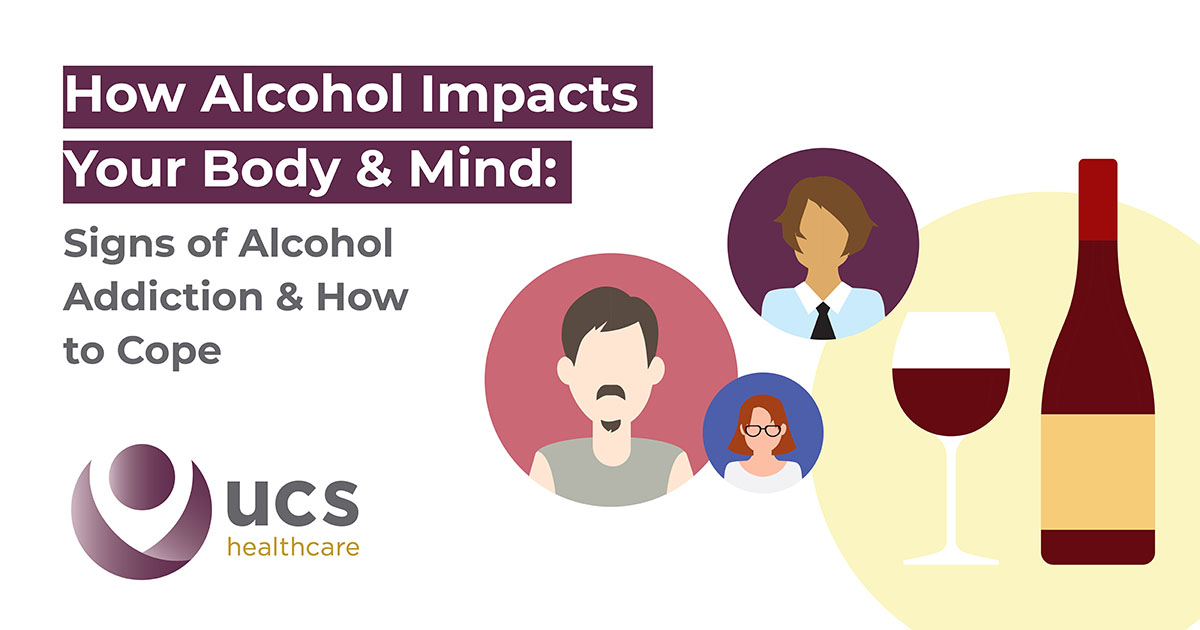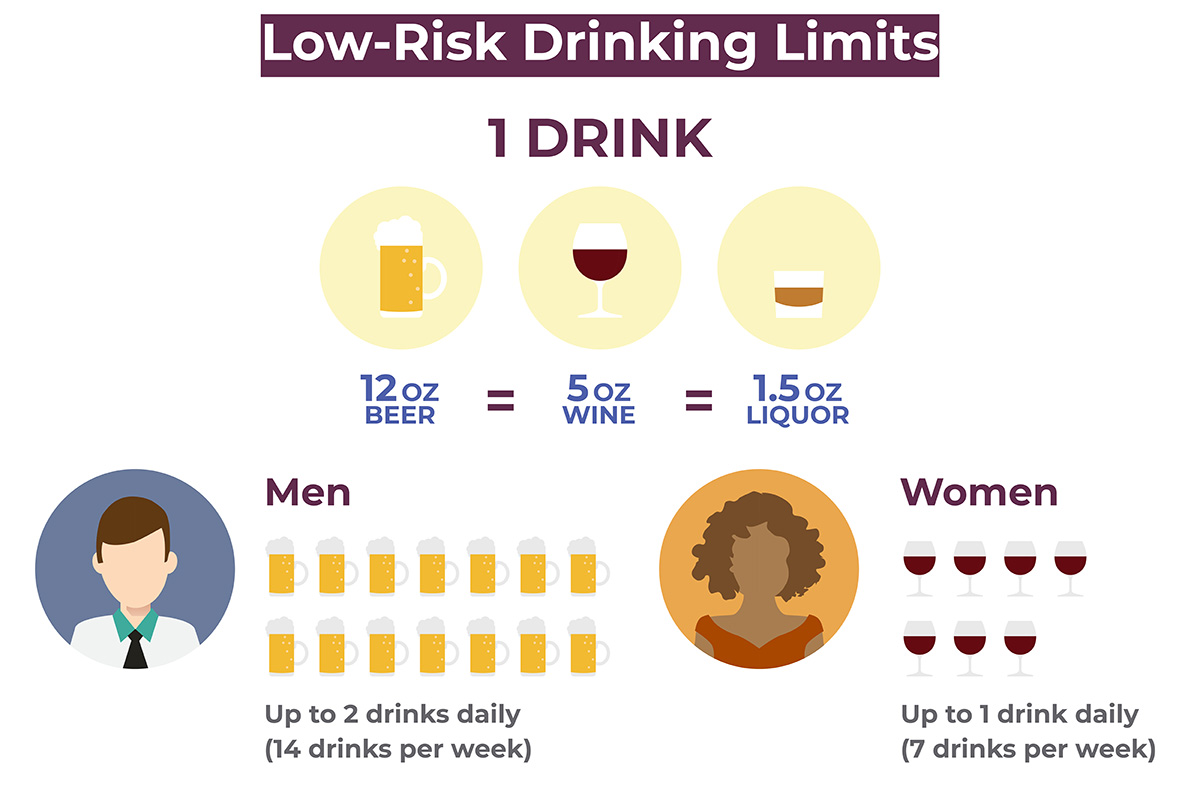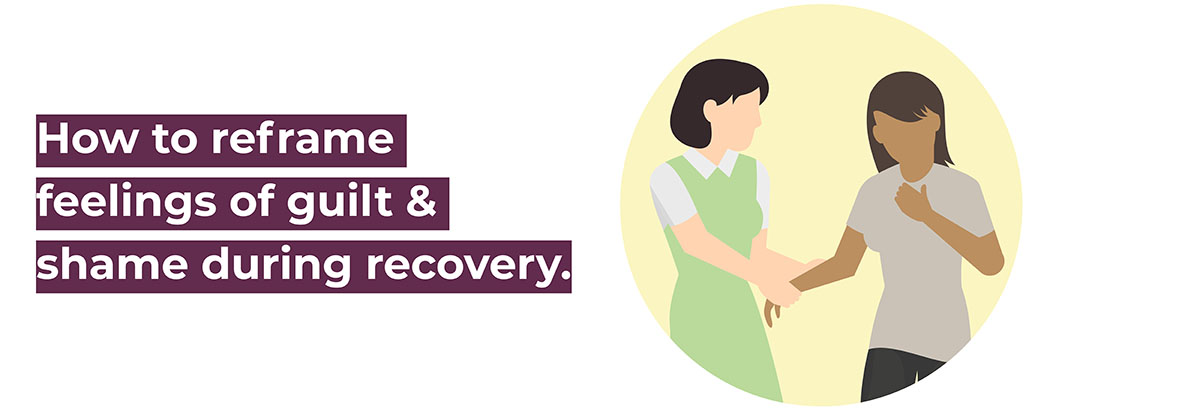Alcohol Addiction: Signs, Physical & Mental Health Effects & How to Cope During Recovery
January 20, 2021

People have been drinking more during the pandemic and it may be impacting you more than you realize. Alcohol has a major impact on your mental health, body and brain. If you’ve increased your alcohol consumption, we want you to be conscious of your usage and consider the signs that your drinking habits may become harmful or dangerous, so you can make changes before it leads to a problem.
Read on to learn more about the impacts of alcohol on the mind and body or skip ahead:
We’ve all faced a lot of forced changes brought on by the pandemic in the last year, and for many people this has led to uncertainty, taking on new responsibilities, financial and work struggles, changes in the family dynamic and much more. People are not entirely sure how to handle this new situation, and they’re turning to alcohol to help them cope with more fear, anxiety and stress.
Recent studies show that moms started drinking more frequently during COVID. In part, moms drinking habits are changing due to the fact they are often taking on the brunt of childcare tasks like adapting routines and overseeing changes with schooling.
Other reports show that since people are not going out and drinking in restaurants and bars, they’re spending their money on larger packs of alcohol to drink at home. Nielsen says that boxed wine sales went up 44% during the first month of the pandemic crisis, and people are opting to buy 24- or 30-packs of beer or cider as compared to the traditional 6-pack. While this may seem like a trend connected to the pandemic, people need to be aware of the short-term and long-term consequences moderate to heavy alcohol use has on their physical and mental health.
While drinking in moderation may not pose major health risks for adults, drinking excessively every day can lead to unhealthy habits and can be a sign of alcohol addiction. Moderate to heavy alcohol consumption impairs your coordination and can cause serious health problems over time. The effects of alcohol on the body from an addiction can affect your immune system and vital internal organs, such as the brain, heart, liver and more.
Short-Term Side Effects of Drinking Alcohol
The short-term physical side effects of drinking are well-known. These side effects include:
- Reduced control over reflexes, balance and coordination
- Restless or low-quality sleep
- Dehydration
- Alcohol poisoning
- and more
Long-Term Effects of Alcohol on the Body
The long-term physical effects of heavy drinking are less commonly talked about. After many years of moderate to heavy drinking you may experience some of these health problems.
- Weakened immune system. Over time, alcohol will wear down your immune system, increasing the chances of contracting various illnesses such as pneumonia or tuberculosis.
- Heart issues. Drinking excessively can cause major problems with your heart, such as high blood pressure, stroke, cardiomyopathy (stretched heart muscles) and arrhythmias (irregular heart beats).
- Higher chances of cancer. According to the National Institute on Alcohol Abuse and Alcoholism (NIAAA), there are many studies that correlate heavy drinking over time with increased risks for various types of cancer.
- Reduced liver function. Consistent alcohol use can cause liver cancer or various liver inflammation problems.
- Hormone imbalances. Excessive amounts of alcohol can impact your body’s hormones and lead to reproductive problems, like irregular periods for women and erectile dysfunction for men, or reduced fertility for both genders.
- Deterioration caused by acid. The acid in alcohol can result in deterioration of your digestive system, stomach lining and intestinal tract.
How does alcohol impact women differently?
There are many factors that determine how much alcohol a person can tolerate and how soon you’ll see the effects of alcohol on the body. Gender is one of the largest factors, which is why men and women have different guidelines, according to the CDC, for what’s considered a moderate level of alcohol consumption. Please note, the CDC recommends that adults of legal drinking age can choose not to drink or should follow the guidelines for low risk drinking:
- Men who choose to drink in moderation should limit themselves to 2 drinks or less containing alcohol each day, and no more than 14 drinks per week.
- Women should limit alcohol intake to 1 drink or less each day, and no more than 7 drinks per week.

Along with the weight disparities that allow higher alcohol use for men, the differences in the makeup of women’s bodies work against them when consuming alcohol. These factors make females more susceptible to severe health consequences from heavy drinking than their male counterparts.
- Women produce smaller amounts of an enzyme that breaks down alcohol in the liver, called alcohol dehydrogenase (ADH)
- Body fat retains alcohol, and the average female body has a naturally higher percentage of body fat compared to men.
- Women’s bodies have lower levels of body water, which helps to disperse alcohol.
Regular alcohol use can have significant consequences for your brain, especially when you’re drinking heavily. Poor decisions, inability to concentrate and memory loss are just a few of the side effects drinking alcohol has on your brain.
Short-Term & Long-Term Effects of Alcohol on the Brain
Like the impacts alcohol has on the body, the short-term impacts on the mind are often discussed and well known. Impacts such as impaired decision making, reduced ability to concentrate and mood swings are perceived as part of a temporary hangover after a night of heavy drinking. However, long-term drinking can cause permanent damage to the brain including:
- Loss of attention span. Heavy drinking over time kills brain cells, resulting in diminished gray matter which negatively impacts your ability to think, learn and recall information.
- Memory loss. Extensive alcohol use can damage the hippocampus, the part of the brain that creates memories. Heavy drinkers may have a difficult time recalling past memories, and if the hippocampus becomes permanently damaged, you won’t be able to retain new memories.
In addition to the impacts of alcohol on memory and concentration, alcohol also plays a major role in how people handle mental health disorders. Those who struggle with a substance use disorder often have mental health disorders as well. This is known as co-occurring disorder and it is very common because of the intertwined relationship between substance use and mental health. For example:
- Oftentimes, people turn to alcohol to cope with mental health issues. However, medication used for treating mental health disorders should not be mixed with alcohol, and the effects of drinking can be harmful and make it more difficult to work through mental health issues.
- Moderate or heavy drinking can cause negative thoughts, side effects and emotions that exacerbate mental health disorders such as depression, bipolar disorder, sleep disorders, anxiety disorders and more.
UCS Healthcare frequently treats alcohol and mental health co-occurring disorders, and we can help you come up with a customized treatment that works for you.
So how do you know if it’s time to seek help?
Do you find yourself asking questions like:
- What happens if I drink every day?
- Am I drinking too much?
- How do I know if I have an alcohol problem?
These subtle thoughts running through your mind can be one of the first signs you should make a change to your drinking habits.
If you feel like you are drinking too much, here are some questions to ask yourself to help you identify areas of concern:
- Is my physical or mental health negatively impacted?
- Do I feel guilty, like I am drinking too much?
- Have my family or friends expressed concern? Has drinking had an impact on my relationships?
- Am I having a hard time completing my daily responsibilities?
If you have noticed the negative impacts of alcohol on your mental health or everyday life, you may be struggling with alcohol addiction. Feeling like you’re not in control of your actions, being unable to complete necessary tasks in your day or ignoring concerns about your drinking habits from loved ones are signals that you may have a problem with alcohol.
For many people, drinking may start as a social activity or stress reliever, but as we become comfortable incorporating alcohol into our normal routines, it can slowly get out of hand over time. It’s ideal to get ahead of a growing addiction early and seek help before things get out of hand. However, if you’re not yet ready to seek professional help, Dr. Paul Ascheman, a licensed psychologist at UCS Healthcare, recommends the awareness & adaptation method to monitor the effects of alcohol on the body, brain and overall health.
Awareness: Once you recognize you are drinking too much, start documenting your drinking habits for at least two weeks without changing your current behaviors. You should be tracking the quantity of your alcohol consumption, frequency of drinking, time of day you begin drinking and the reason why you feel the urge to grab a drink.
Adaptation: Think about the outcomes caused by excessive drinking. These could range from not recalling when you put your kids to bed to feeling hungover at work in the morning. Oftentimes we don’t see the problems until we’ve already fallen into the cycle of alcohol abuse. During the adaptation phase, try to come up with solutions that will cut back on your drinking habits and result in better outcomes. A few examples could include:
- Drinking less often
- Drinking smaller amounts in one sitting
- Limiting the time when drinking is acceptable
- Not drinking at all
For some, moderating alcohol use is enough. For others, completely stopping may be the best way to maintain recovery. While we understand this is a difficult transition, many people eventually realize they can only maintain control over their alcohol usage if they cut it out entirely. It can be difficult to admit, but when you realize you may have an alcohol addiction and want to seek help or explore your recovery options, you can get an assessment at UCS Healthcare. Our providers come from all walks of life and show compassion to every patient, customizing the treatments to each unique situation.
After identifying a potential drinking problem, you may feel shame and guilt, but try to remain positive. Many people suffer from substance use disorders, and the numbers have increased significantly during the pandemic.

Many people try to minimize, justify or rationalize the issue at hand because it is very difficult to accept the idea that your alcohol use has become dangerous. You may not want to admit to your alcohol problem because you believe:
- I am weak or a failure for allowing myself to fall into this habit.
- I am disappointing or embarrassing my family.
- My friends and others are judging me for seeking help or choosing not to drink alcohol.
Many people may feel this way, but you are not alone and you are not a failure! You are taking the most important step by recognizing you need to make a change. Try to reframe your concerns to accurately reflect your situation:
- I am NOT a failure for needing help. I am strong for being aware that I cannot fight my alcohol addiction alone. I am smart for seeking the help I need before the problem progresses.
- I am NOT disappointing my family. I am making a decision that will positively impact us in the future, repairing damaging behavior and setting a better example for my children.
- The people who are judging me are NOT the friends I need during this journey. My true friends are here to support me, lift me up and help me in times of need.
UCS Healthcare is Here to Help You Regain Control Over Alcohol and Your Mental Health
If you want to talk with someone about your mental health or substance use, our counselors are here to help, in person or through virtual care. We understand it can be difficult to reach out, but know that we’ve seen cases from all walks of life and there is never judgement for any situation. Contact us to schedule an appointment today!
Learn more about how alcohol consumption has changed during the pandemic in our COVID article series:
UCS Healthcare is part of the IDPH Integrated Provider Network, with services funded by the Iowa Department of Public Health and the U.S. Dept. of Health and Human Services Substance Abuse and Mental Health Services Administration.